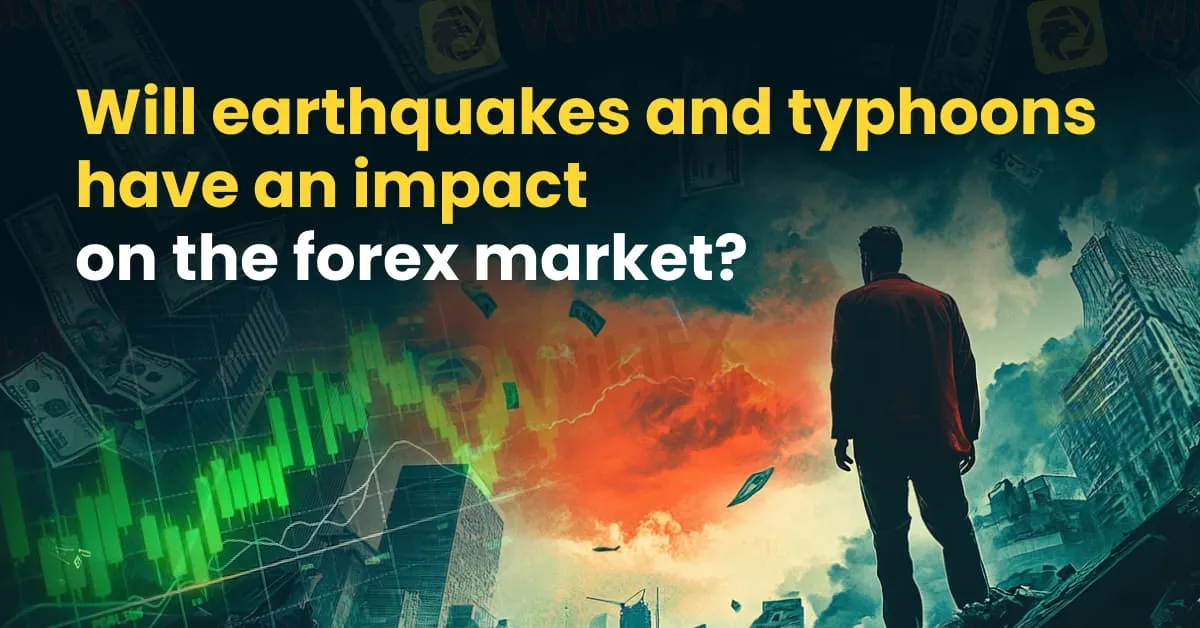简体中文
繁體中文
English
Pусский
日本語
ภาษาไทย
Tiếng Việt
Bahasa Indonesia
Español
हिन्दी
Filippiiniläinen
Français
Deutsch
Português
Türkçe
한국어
العربية
Will natural disasters have an impact on the forex market?
Abstract:The forex market is known for its rapid responses to global events, but the influence of natural disasters, such as earthquakes and typhoons, can be less straightforward. While headlines may scream about catastrophic damage and economic disruption, the long-term effects on currency values often depend on a blend of immediate shock and underlying economic fundamentals.

The forex market is known for its rapid responses to global events, but the influence of natural disasters, such as earthquakes and typhoons, can be less straightforward. While headlines may scream about catastrophic damage and economic disruption, the long-term effects on currency values often depend on a blend of immediate shock and underlying economic fundamentals.
Forex Market Sensitivity to Global Shocks
At its core, the forex market is driven by investor expectations about economic performance. Global events—from political shifts to natural disasters—can introduce volatility. However, seasoned traders know that the market is forward-looking. A brief spike in volatility is common, but currencies eventually gravitate toward values that reflect long-term economic strength and policy direction. As noted by Investopedia, “global events can immediately affect exchange rates and currency values due to the interconnectedness of the forex marketplace.”
Earthquakes vs. Typhoons: Different Disasters, Different Impacts
Earthquakes
Earthquakes tend to have an immediate, dramatic effect because they often strike without warning and can severely damage critical infrastructure. A historical example is Japan‘s 2011 Tōhoku earthquake and tsunami. Despite the initial plunge in market confidence, Japan’s currency—while volatile—recovered as investors focused on the countrys robust economic fundamentals and reconstruction efforts. This case shows that even catastrophic events might only lead to short-term market disruptions if the long-term outlook remains positive
Typhoons
Typhoons, on the other hand, are usually forecasted days in advance. This lead time often allows governments and businesses to activate emergency measures and secure insurance payouts, which can mitigate the immediate economic shock. In regions prone to typhoons, such as parts of Southeast Asia, the impact on the forex market is typically localized. Although there might be temporary shifts—especially in sectors like agriculture and tourism—the overall currency value is less likely to suffer a prolonged decline, as reconstruction and relief measures quickly restore market confidence
Why the Forex Market Often Braces for the Storm
A key factor in the forex markets resilience is its forward-looking nature. Traders and investors focus on long-term fundamentals like GDP growth, monetary policy, and overall economic health. Even when a disaster introduces short-term uncertainty, if the underlying economic framework remains strong, the currency is likely to recover. Moreover, global financial networks—ranging from insurance mechanisms to international aid—help cushion the economic blow, limiting the sustained impact on exchange rates.
Strategic Considerations for Traders
For forex traders, understanding the nuanced impact of natural disasters is essential. Here are some strategies to consider:
- Risk Management: Use stop-loss orders and diversify exposure to limit potential losses during volatile periods.
- Hedging: Consider instruments like options or forward contracts to mitigate short-term risk.
- Stay Informed: Monitor both the immediate news and longer-term economic indicators, ensuring that decisions are guided by the broader economic outlook rather than panic.
Conclusion
While earthquakes and typhoons can induce short-term volatility in the forex market, their long-term impact is often moderated by the markets reliance on economic fundamentals and its forward-looking nature. Even in the face of dramatic natural events, well-prepared economies and effective risk management strategies can help stabilize currency values over time.

Disclaimer:
The views in this article only represent the author's personal views, and do not constitute investment advice on this platform. This platform does not guarantee the accuracy, completeness and timeliness of the information in the article, and will not be liable for any loss caused by the use of or reliance on the information in the article.
Read more

Never Heard of Dynasty Trade? Here's Why You Should Be Worried
Have you heard this name before? No , it’s time you do because staying unaware could cost you. This platform is currently active in the forex trading and has been linked to several suspicious activities. Even if you’ve never dealt with it directly, there’s a chance it could reach out to you through ads, calls, messages, or social media. That’s why it’s important to know the red flags in advance.

Catch the Latest Update on BotBro & Lavish Chaudhary
BotBro, an AI-based trading platform, became popular in India in 2024—but for negative reasons. Its founder, Lavish Chaudhary, who gained a huge following by promoting it heavily on social media. Since then, he has become well-known, but for many controversies. Let’s know the latest update about Botbro & Lavish Chaudhary.

Trading Other People’s Money | What Prop Firms Don’t Tell You
Proprietary (prop) trading firms have become increasingly popular. They give traders the chance to trade with larger amounts of money without risking their own savings. For many, this sounds like the perfect opportunity to grow faster and earn more. But while the benefits are appealing, there are also risks and hidden rules that traders must understand before joining a prop firm.

What WikiFX Found When It Looked Into Aron Markets
When it comes to online trading, the broker you choose can make or break your trading journey. A reputable and regulated broker offers a sense of security and accountability, while unregulated brokers often pose significant risks to traders. Aron Markets is one such broker that raises multiple concerns due to its lack of valid regulation and its registration in a high-risk offshore location.
WikiFX Broker
Latest News
RM750 Million Lost to Investment Scams in Just Six Months
5 things to know before the Thursday open: Meme stock revival, Trump's Fed visit, Uber's gender feature
Why Octa Is the Ideal Broker for MetaTrader 4 & 5 Users
CNBC's Inside India newsletter: Leaving, but not letting go — India's wealthy move abroad, but stay invested
Moncler raises prices on tariffs, may postpone store openings if downturn worsens
Titan FX Adds WhatsApp and Telegram for Enhanced Support
Nestle flags further potential price hikes as tariffs, commodities weigh on margins
Stop Level Forex: How Does it Help Traders Prevail When Losses Mount?
eToro Launches Spot-Quoted Futures Trading in Spain
Titan FX Introduces Redesigned Client Cabinet for Enhanced Usability
Currency Calculator


